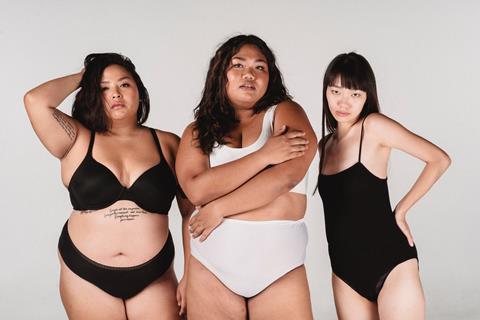Food Addiction Coach and author of Craving Freedom, Dr Bunmi Aboaba, explain the sets you can take to enjoy your body instead of constantly criticise.
Somewhere along my journey of self-acceptance, one single question stopped me in my tracks: would you talk to your best friend the way you speak to yourself?

The answer was a hard no, because the way I spoke to myself was often scathing, condescending, mocking, and downright unkind, especially around my body shape, weight, and perceived flaws and imperfections. I had become so used to this cruel inner critic that I was largely unaware when it spoke and I had been utterly oblivious to the fact that not only was it causing me harm, but it was in my power to change what it said.
Negative feelings and thoughts towards one’s body are defined as body dissatisfaction or body image distress. This negative perspective of one’s body image is often a symptom, or predictor, of an eating disorder. Body image distress usually occurs among those with mental health disorders - including food addiction, depression, and anxiety.
Negative body issues among adolescents have been found to affect 50 per cent of girls and this rises to 80 per cent of women in the adult population. As a result, many individuals attempt dangerous fad diets, excessively restrict food, purge, use laxatives, obsessively exercise, or even undergo plastic surgery to try and resolve the feelings of dissatisfaction.
Negative body issues affect 50 per cent of girls and this rises to 80 per cent of women in the adult population.
That said, it should also be noted that many individuals experience body image issues without turning to unhealthy coping mechanisms or negative behaviours. But if you recognise that you need to tackle a negative body image, what should you do? To begin with, it is important to note that it may be impossible to become entirely free of body image concerns as the perfect appearance is a concept perpetuated throughout our society. That said, here are five actions you can take:
Stop That Negative Inner Chatter
Compliment yourself each day. Choose an area of your body that you like – perhaps your skin, hair, ankles, eyes, shoulders. Take some time to enjoy that area through touch and visual appreciation. The more you do this, the more that voice will change its tone. Once you get a handle on your inner critic—and simply being aware they are there is a sign of enormous progress—you can start to get to the nitty-gritty of change.
Challenge Avoidance and Body Checking
If you are used to body checking multiple times a day or undergo the opposite - hiding your body from yourself and others - try to make gradual steps to change this. If there are clothes that you are afraid to wear outside, start wearing those clothes indoors – wearing them in the house allows you to get used to them and build confidence.
Gratitude Interventions
Keeping a gratitude journal is a wonderfully positive daily exercise. Start each day with five things you are grateful for, and you will quickly discover that your mindset shifts. Maybe you are thankful for having a home, the sunrise, that first cup of coffee in the morning, hugging your child, or taking part in outdoor activities.
Move More
Exercise is known to boost our endorphins and make us feel energised and optimistic. Improving fitness can also improve body image by encouraging individuals to focus more on their overall health and energy levels and less on their appearance.
Buy Clothes That Fit NOW
Buying clothes that do not quite fit is not a great motivator – all this does is cause us psychological harm. Embrace your body the way it is today. Buy clothes that you love that flatter you the way you are now. This will increase your self-esteem and self-worth exponentially.
































No comments yet